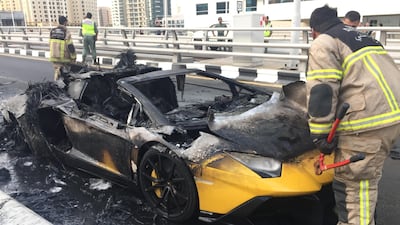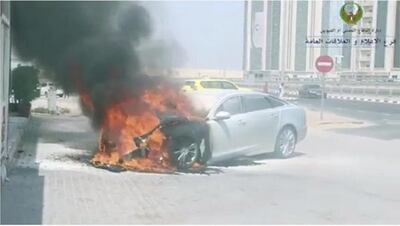A combination of the UAE’s high temperatures and plain old showing off are largely to blame for the series of supercar fires seen in the country, experts say.
Over-fuelling, over-heating and over-revving are all issues that could turn a million-dirham car to a burnt-out shell quicker than you can spell Lamborghini.
Over the years there has been several incidents of ultra-fast, expensive vehicles catching fire in the UAE, the most recent being one that went on fire at an Adnoc filling station in Abu Dhabi this month, though luckily observant pump attendants were on-hand to put it out quickly. Two years ago, video also emerged of someone revving a Lamborghini Aventador in Dubai Marina so much that it also burst into flames and was left a charred wreck.
Experts say that supercars are often driven fiercely by their owners and the mechanical parts can become extremely hot. In addition, more modest family vehicles and Umm Al Quwain Police earlier this month said seven cars had burst into flames in the space of several weeks.
“Many supercars are often driven very hard and at high revs and the drivers zoom into gas stations with their engine very hot indeed, and in some cases their exhaust outlet manifold can be glowing red with heat,” said Robert Hodges, a UK-based technical and road safety expert.
“It is always better to plan a stop in a supercar during the summer months, and to deliberately drive for the last couple of miles at a slower, more gentle speed to let the vehicle’s cooling systems get the engine bay a little cooler to prevent damage before stopping.
“We also live in a very hot climate in the UAE during the non-winter months, and so often high-performance cars are working at the extreme end of their engine and component capabilities.”
Many supercar fires are caused by incompetent or careless fuelling, with petrol coming into contact with hot components, Mr Hodges added.
____________________
Read more:
Petrol station attendants praised for putting out supercar fire
____________________
“Many service station attendants tend to ‘overfuel’ cars by topping-off fuel tanks until they almost overflow, while loose fuel hoses and connectors, or where engine bay fuel lines have been modified or tampered with often leak raw fuel onto very hot engine parts, and an explosive fire can easily start,” he said.
“I have also seen many people not turn off their engines while the car is being refuelled so that they can run the A/C and this is a very dangerous practice, rapidly leading to engine overheating, especially during summer months.”
Supercars are often worked very hard, at the limit of their performance, so they need to be looked after carefully and all regular servicing must be completed on time.
Mr Hodges said that manufacturers design and build cars to very high safety and performance standards but the way in which they are used is outside of their control.
“At very high temperatures, even the alloy wheels of a car can burn incandescently like a firework as well as the paint if it comes in contact with vaporising burning fuel,” he said.
Aftermarket modifications can also cause problems unless they are fitted by highly reputable specialist workshops, Mr Hodges said.
“In general, any aftermarket modification which would invalidate the vehicle’s original warranty should not be fitted,” he said.
“Increasing the performance of a car, such as improving brakes and adjusting suspension, without attending to other factors will often cause a problem, and the most common one is causing the engine bay to overheat.
“Manufacturers of supercars spend a long time developing their cars to be safe and reliable as well as enjoyable - unintended aftermarket modifications can often negate all of the built-in safety and reliability.”
Another factor that can create problems in this region is using non-GCC spec cars, which are not built for the harsh environment.
"The manufacturers usually supply Gulf specification cars to our country, however some purchasers import grey market cars that are not built to Gulf spec and which are more likely to overheat,” said Mr Hodges.
“Any supercar owner should really realise that the summer climate in our region can present real problems if you use a supercar to its limits during summer daytime hours.
“Drivers should exercise what I call ‘vehicle sympathy’ and realise that even expensive cars can be broken by extreme use and temperatures.”
He advice to motorists is to drive sensibly, ensure radiators are topped-up with the correct coolant, let the engine cool-off before stopping by driving slower for the last couple of kilometres and ensure the car is serviced regularly to the manufacturer’s specified list by an approved service agent.


